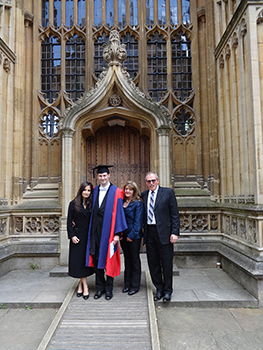Latest News Archive
Please select Category, Year, and then Month to display items
24 September 2024
|
Story Aimée Barlow
|
Photo Supplied
 Louzanne Coetzee, who made history by clinching South Africa’s second medal at the Paralympics, earning a bronze in the T11 1 500 m women’s final with a personal best time, received a warm reception when she recently returned home.
Louzanne Coetzee, who made history by clinching South Africa’s second medal at the Paralympics, earning a bronze in the T11 1 500 m women’s final with a personal best time, received a warm reception when she recently returned home.
The celebrated Paralympic bronze medallist Louzanne Coetzee returned home to a warm welcome at the Bram Fischer International Airport on 10 September 2024.
Family, friends, colleagues, Arista students, and media gathered to celebrate her remarkable achievement and show their support.
Coetzee – KovsieSport Coordinator of Parasport at the University of the Free State (UFS) – made history by clinching South Africa’s second medal at the Paralympics, earning a bronze in the T11 1 500 m women’s final with a personal best time. Her dedication and hard work have not only brought her personal glory but have also inspired many in her community.
Among those present to welcome her was Jerry Laka, Director of KovsieSport, who expressed his pride in Coetzee’s accomplishments.
"We as KovsieSport are so proud of our colleague Coetzee. It is amazing to see a product of KovsieSport achieving greatness on the world stage. She is truly an inspiration to us all," said Laka.
“I am so glad to be back, and to have Laka and my colleagues here. It means the world to me. Having Laka here shows his commitment to my career and ParaSport and his staff in general,” shared Coetzee, her gratitude evident.
She further expressed her appreciation for the support she received, stating, “I don’t have the words to describe how thankful I am for the support from the UFS community.”
Coetzee’s return is a proud moment for South Africa and the University of the Free State (UFS) community. Welcome home, Louzanne! Your achievements have made us all proud!
UFS alumnus receives PhD in Statistics from the University of Oxford
2016-06-03

In May of this year, DW Bester obtained
a DPhil in Statistics at the University of
Oxford.
Photo: Supplied
On 14 May this year, Dr DW Bester received a DPhil in Statistics from the University of Oxford. The entire ceremony, which was held in the Sheldonian Theatre in Oxford, was conducted in Latin, as has been the case for the past 800 years.
Dr Bester completed his undergraduate studies and his honours degree at the University of the Free State (UFS). “At first, I was only planning to study for a master’s degree, but was privileged to get an opportunity to do a PhD as well. I didn’t think twice!” he says.
Studies at the University of Oxford
Universities in England do not require a master’s degree for PhD studies. With the help of Prof Max Finkelstein from the UFS Department of Mathematical Statistics and Actuarial Science, Dr Bester registered for the DPhil programme in Statistics directly after his honours studies.
“The title of my thesis was: Joint survival models: A Bayesian investigation of longitudinal volatility. It dealt with a problem in the medical field to determine the cause of stroke risk: is it the absolute level of blood pressure, or the volatility thereof? The analysis of this question led to interesting models which needed advanced application techniques. I had to study these techniques and write programmes for their application.
Although Dr Bester is working currently as the technical head of a company that calculates insurance for power stations, satellites, rockets, and cyber risks, he would like to continue working with his Oxford supervisor in future to make the techniques they have developed more accessible for researchers outside of the field of statistics.
“Studying at Oxford requires hard work, perseverance, and a lot of luck. Luck plays a big role, since there are no guarantees that hard work will ensure you a spot in one of the top universities.
Regarding his studies at Oxford, Dr Bester thinks back on his exposure to the GNU/Linux operating system, and free software. “I have seen how valuable this is for analyses in practice. I also had the privilege of meeting the father of free software, Richard Stallman,” Dr Bester says.
2011 Rhodes Scholar
He was elected as Rhodes Scholar in 2011. According to Dr Bester, who has been interested in Mathematics since high school, the Rhodes scholarship was something of a fluke. He applied for the Rhodes scholarship on the recommendation of Prof Robert Schall of the Department of Mathematical Statistics and Actuarial Science.
Role of the UFS in his successes
In addition to the continued support from the team of passionate professors and lecturers at the UFS, the actuarial degree at the UFS is fraught with statistics. Emphasis is also placed on Bayesian statistics. This was crucial to his studies at Oxford. According to Dr Bester, this topic is emphasised strongly in the international statistics community.
Dr Bester regards the work done by two of his lecturers, Michael von Maltitz and Sean van der Merwe, among his highlights at the UFS. Since our first year, they have created an atmosphere of camaraderie among the students. “I think this contributed to the success of everybody. They also make an effort to present topics outside of the syllabus regularly,” says Bester.